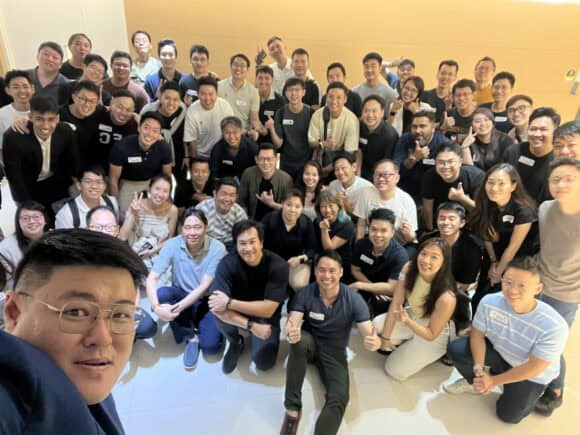19 Business Lessons from Adam Khoo, Patrick Cheo and Sant Qiu at Hello Singapore Marketers July Meet-Up
I had the opportunity to collaborate with Leon and Joel from Hello Singapore Marketers Community to host a panel discussion featuring three successful entrepreneurs: Adam Khoo, Patrick Cheo and Sant Qiu at our iFAST office. Being able to host events like these gave me insider access to learn from experts from different industries. What stood out to me was how deeply they reflected on their journeys and how honest they were about what really drives long-term business success.
Here are the 19 business lessons I took away from the event and each of them are practical lessons that would work for anyone running a business or thinking of starting one.
Every week, I’ll be sharing practical tips and invaluable knowledge to guide you on your path to financial independence.
1. Too much startup capital can hurt more than help
Having access to a large amount of capital at the start may seem like a blessing, but it often leads to unnecessary spending. Adam Khoo and Patrick Cheo warned that excess funds can be used on liabilities instead of strategic investments. Without financial pressure, founders may lose the drive to solve problems creatively.
2. You do not need big money to succeed
Successful companies like Apple, Dell and KFC all began with very little capital. Their stories prove that a huge upfront investment is not a requirement. What matters more is the strength of your idea and the discipline to execute it well.
3. Adaptability is what keeps businesses alive
Adam Khoo reminded us that it is not the strongest who survive, but the most adaptable. In business, the ability to evolve and respond to changing market conditions is what keeps you going when others falter.
4. Go digital before the crisis hits
The COVID-19 pandemic exposed which businesses were prepared and which were not. Those who had already moved their operations online managed to survive, while others had to shut down. Early digital adaptation is no longer optional.
5. Build systems so you can work on the business, not in it
Adam emphasised a principle from “The E-Myth”. If you are constantly involved in day-to-day operations, your business cannot scale. Sustainable growth comes from building systems that allow others to execute without you.
6. A pivot can change everything
Patrick shared how his company shifted from international corporate training to digital financial education. This pivot transformed their revenue model, with Piranha Profits now making up 80 percent of the business. Reinvention can be the key to growth.
7. Passion drives mission-led entrepreneurs
Entrepreneurs like Elon Musk and Steve Jobs stayed committed through near-bankruptcies because they were mission-driven. When challenges become overwhelming, a sense of purpose keeps you going. Money alone is rarely enough.
8. Challenge complexity increases as business scale
Patrick Cheo observed that as a business grows, so do its challenges. In the early stages, the focus is on making sales. But as the company scales, you must manage teams, build infrastructure and create efficient processes, all at the same time.
9. Your support system matters more than you think
Behind every successful entrepreneur is often a supportive family or partner. Without that emotional and logistical backing, many business owners struggle to survive the pressure that comes with growing a company.
10. Customer feedback can shape your strategy
Sant discovered an untapped opportunity when customers using their probiotic product for gut health began reporting improvements in menopause symptoms. This insight led to a shift in their marketing and product focus.
11. Knowing buzzwords is not required
Patrick admitted that he only learned terms like TAM and SAM later in his journey. What mattered more was understanding the principles — identifying a large market, finding a gap, and building a solution people wanted.
12. Rebrand with a purpose
Patrick talked about restructuring his company so that Adam Khoo Learning Technologies became a holding company for charitable initiatives, while business operations moved under different brand names. This strategy allowed them to protect brand equity while expanding the business independently of any one identity.
13. Give real value in your free content
Adam Khoo’s YouTube strategy was simple but powerful — he offered substantial educational content for free. Instead of using free videos as a teaser for paid programmes, he focused on building trust. Many viewers later commented that they learnt more from his free videos than from paid courses by others.
14. Content quality matters more than production value
Adam did not use fancy cameras, lighting or microphones when he started. His videos were filmed with a basic webcam. What made them successful was the clarity and usefulness of the content, not the visuals.
15. One piece of content can go far with the right distribution
Adam posts the same video content across YouTube, X, Facebook, LinkedIn and Threads. This multi-platform approach gives him more touchpoints with his audience and extends the reach of every piece of content.
16. Being provocative can boost engagement, but value must follow
While bold content helps grab attention, Adam and others cautioned that it must be balanced with educational value. Without that, you risk losing credibility, especially in sensitive industries like finance and education.
17. Singapore still has structural barriers to entrepreneurship
Patrick explained that Singapore’s society still favours academic and corporate careers over entrepreneurship. Despite efforts to promote innovation, most businesses do not survive beyond a few years. The local market is also small, which limits growth.
18. Treat failure as feedback
Patrick encouraged entrepreneurs to see setbacks as learning opportunities. Instead of giving up when something does not work, adapt the strategy and keep going. This mindset is crucial for long-term resilience.
19. Business is like investing. It rewards patience
You cannot rush success. Like investing, building a business takes time, persistence and the ability to deal with disappointment. The quick wins are rare. Most progress comes from consistent effort over years.
Listening to Adam Khoo, Patrick Cheo and Sant Qiu share their lessons was a reminder that business success is rarely about shortcuts or secret formulas. It is about being grounded in reality, making tough decisions, adapting when the landscape shifts, and staying committed even when the results take years to show.
Whether you are at the start of your journey or navigating a plateau, these takeaways offer timeless guidance. Some lessons were strategic, others deeply personal, but all came from real experience.
If you are building something of your own, I hope these insights offer clarity, encouragement and a few ideas you can take action on. Let me know which lesson resonated most with you. I would love to hear your thoughts.


